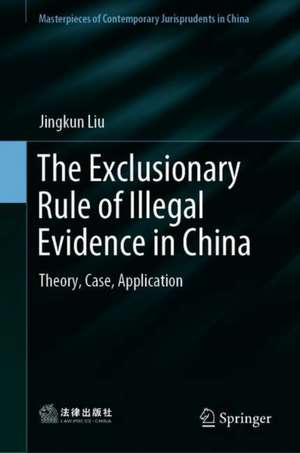The Exclusionary Rule of Illegal Evidence in China: Theory, Case, Application: Masterpieces of Contemporary Jurisprudents in China
Autor Jingkun Liuen Limba Engleză Hardback – mar 2019
The book reviews the origin and development of the exclusionary rule in China, and systematically explains the problems and challenges faced by criminal justice reformers. The earlier version of the exclusionary rule in China pays more attention to confessions obtained by torture and other illegal methods, reflecting that the orientation of the rule aims mainly to prevent wrongful convictions. Since the important clause that human rights are respected and protected by the country was written in the Constitution in 2004, modern notions such as human rights protection and procedural justice have been widely accepted in China. The book compares various theories of the exclusionary rule in many countries and proposes that the rationale of human rights protection and procedural justice should be embraced by the exclusionary rule. At the same time, the book elaborately demonstrates the thoughts and designs of the vital judicial reform strategy--strict enforcement of the exclusionary rule, including clarifying the content of illegal evidence and improving the procedure of excluding illegal evidence. In addition, the book discusses the influence of the exclusionary rule on the pretrial procedure and trial procedure respectively and puts forward pertinent suggestions for the trial-centered procedural reform in the future.
In the appendix, the book conducts case analysis of 20 selected cases concerning the application of the exclusionary rule. This is the first book to give a comprehensive and systematic analysis of the exclusionary rule of illegally obtained evidence in China. The author of the book, senior judge of the Supreme People’s Court in China, with his special experience of direct participation in the design of the exclusionary rule, will provide the readers with thought-provoking explanation of the distinctive feature of judicial reform strategy and criminal justice policy in China.
Preț: 735.38 lei
Preț vechi: 896.81 lei
-18% Nou
Puncte Express: 1103
Preț estimativ în valută:
140.71€ • 146.92$ • 116.46£
140.71€ • 146.92$ • 116.46£
Carte tipărită la comandă
Livrare economică 04-18 aprilie
Preluare comenzi: 021 569.72.76
Specificații
ISBN-13: 9789811337550
ISBN-10: 9811337551
Pagini: 312
Ilustrații: XV, 335 p. 2 illus.
Dimensiuni: 155 x 235 mm
Greutate: 0.67 kg
Ediția:1st ed. 2019
Editura: Springer Nature Singapore
Colecția Springer
Seria Masterpieces of Contemporary Jurisprudents in China
Locul publicării:Singapore, Singapore
ISBN-10: 9811337551
Pagini: 312
Ilustrații: XV, 335 p. 2 illus.
Dimensiuni: 155 x 235 mm
Greutate: 0.67 kg
Ediția:1st ed. 2019
Editura: Springer Nature Singapore
Colecția Springer
Seria Masterpieces of Contemporary Jurisprudents in China
Locul publicării:Singapore, Singapore
Cuprins
The Origin and Development of Exclusionary Rule in China.- The Character and Orientation of the Exclusionary Rule.- The Type, Standard and Mode of Exclusion of the Illegally Obtained Evidence.- The Procedure of Excluding the Illegally Obtained Evidence.- The Exclusionary Rule and the Reform of Pretrial Procedure.- The Exclusionary Rule and the Reform of Trial Procedure.- Appendix: Cases and Application.
Notă biografică
Jingkun Liu, former Deputy Presiding Judge of the Supreme People’s Court in China, is Professor of Law at the China University of Political Science and Law. His work ranges from criminal procedure, criminal justice policy, the law of evidence, to human rights, and death penalty.His books include The Rule and Method of Examining and Analyzing Evidence; Truth and Justice in Court; Criminal Trial Method; and The Rule of Criminal Evidence. He has translated several books into Chinese, including Errors of Justice; Crime Reconstruction; and Unfair.
Textul de pe ultima copertă
The book reviews the origin and development of the exclusionary rule in China, and systematically explains the problems and challenges faced by criminal justice reformers. The earlier version of the exclusionary rule in China pays more attention to confessions obtained by torture and other illegal methods, reflecting that the orientation of the rule aims mainly to prevent wrongful convictions. Since the important clause that human rights are respected and protected by the country was written in the Constitution in 2004, modern notions such as human rights protection and procedural justice have been widely accepted in China. The book compares various theories of the exclusionary rule in many countries and proposes that the rationale of human rights protection and procedural justice should be embraced by the exclusionary rule. At the same time, the book elaborately demonstrates the thoughts and designs of the vital judicial reform strategy--strict enforcement of the exclusionary rule, including clarifying the content of illegal evidence and improving the procedure of excluding illegal evidence. In addition, the book discusses the influence of the exclusionary rule on the pretrial procedure and trial procedure respectively and puts forward pertinent suggestions for the trial-centered procedural reform in the future.
In the appendix, the book conducts case analysis of 20 selected cases concerning the application of the exclusionary rule. This is the first book to give a comprehensive and systematic analysis of the exclusionary rule of illegally obtained evidence in China. The author of the book, senior judge of the Supreme People’s Court in China, with his special experience of direct participation in the design of the exclusionary rule, will provide the readers with thought-provoking explanation of the distinctive feature of judicial reform strategy and criminal justice policy in China.
Caracteristici
Gives comprehensive and systematic introduction of the exclusionary rule of illegally obtained evidence and its application in modern China Outlines the origin and development of the exclusionary rule in China and analyses the underlying rationale and the design of the rule in detail Provides readers with thought-provoking explanation of the distinctive feature of judicial reform strategy and criminal justice policy in China

